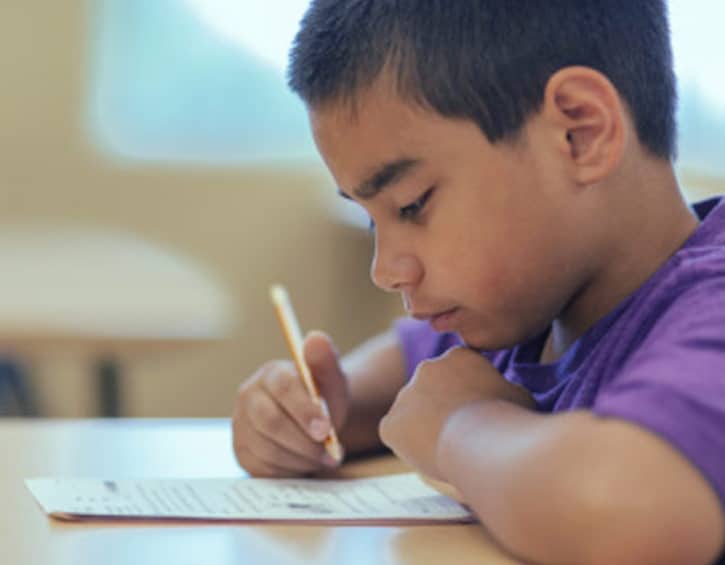
 Post Category - ParentingParenting - Post Category - BabyBaby - Post Category - Toddler & PreschoolerToddler & Preschooler - Post Category - Older KidsOlder Kids
Post Category - ParentingParenting - Post Category - BabyBaby - Post Category - Toddler & PreschoolerToddler & Preschooler - Post Category - Older KidsOlder KidsHere’s why we should be OK with letting our sons be emotional
In a world where pink is for girls and blue is for boys, I find myself a fierce champion for my son to have space to express his feelings. I’m sure I’m not alone. In fact, most of the mums I spoke to during the course of writing this story felt slightly relieved that they weren’t the only ones who really didn’t appreciate people telling their sons that boys don’t cry.
I’ve witnessed a number of incidents where my son has been told not to cry when he’s taken a big fall, not to scream when he’s feeling frustrated, not to cling to mummy when he’s feeling overwhelmed because he’s a big boy now and he shouldn’t feel afraid. He’s all of 17 months.
At the risk of sounding too protective, all of these messages worry me. They reinforce the idea that my son needs to put a lid on his feelings to be considered ‘strong’, ‘brave’, and dare I say, worthy of our love. Maybe that’s why I watch him sleep with such softness now, because I’m almost expecting that every minute he grows, is one minute further from me.
Read More: Children’s’ Books to Encourage Sensitive Boys

The sad truth is that there is a limited amount of time I have to keep my son at arm’s length from the barrage of labels society is eagerly waiting to paste on him (oh, there are terrible stereotypes for girls too!). This convenient way for everyone else to make sense of who my son is in relation to them will be a war he will have to fight on his own. Until that day though, every day will be an opportunity to teach and remind him how strong his own two feet can be. Where those feet will take him will start with how we help them grow. If you find yourself in a similar boat, feeling like I do, take comfort that you’re not alone. Here’s a reminder I’ve written for myself, and all other mums out there building our gentlemen of tomorrow:
Read More: Children’s Books to Encourage Strong Girls
For Courage & Strength
I will remind my son that it takes just as much strength to ask for help when he needs it, as it does to grit his teeth and finish his homework, especially when the questions are tough. I will teach him how to say no to bullies by first teaching him to respect himself. This means always looking him in the eye when we speak, and never dismissing his words or thoughts just because they aren’t the same as mine.
I will stay close, especially during new and strange situations so that his curiosity to venture out and explore will be directly proportionate to his sense of security knowing that I will be there when he needs to come home. One day he will find his own sense of home in his heart as he embarks on his own adventure in this great big world. I will not overreact when he’s had a fall, but always ask him how he feels and if he might need a cuddle. I will also be sure to let him know that the pain and bruises aren’t fun, but they’re also temporary. In the meantime, we can lie on the grass and watch the clouds pass by until the pain goes away.
For Big Feelings
The bigger the feelings, the smaller my voice will be. Instead, I will hold him close so he knows that I will support him even when he’s not having the best day. I will remind him that while he feels like hitting and screaming, he needs to use a different sound so he doesn’t hurt his throat; and throw pillows instead of punches. For days that feel especially long, we will head outside to the playground where he is free to run and climb, where I can say “yes” more often than “no”. I will help him understand why he feels the way he does, and that there is nothing wrong with feeling that way. There are right ways to deal with our feelings, but there are never wrong feelings. Honesty starts with being honest with ourselves. I will also make a bicarbonate soda volcano to show him what happens to feelings when we keep them inside for too long. Big feelings are a lot smaller when we offer them kindness and patience.
Read More: Understanding the Basics of Respectful Parenting

For Independence
The struggle is real, and necessary. I will offer him the beauty of time, where he has space to tinker and figure things out on his own. Some days he might not have the patience or the ability to solve his problems, but as I guide him, I will also affirm that every effort he makes is one step closer to getting to where he wants to go. I will remember to hear his voice, especially through my own pride and sense of knowing better. The best thing I can do is to appreciate the child that is in front of me, without burdening him with weight of all the expectations and worn out ideas I might so easily place on him. I will step back when he refuses my help, and instead of holding my breath, I will breathe calmly so he knows that he has my fullest support. It’s much better to root for him to succeed, than worry about him failing.
Read More: Raising Calm Kids
For Empathy
To share, to offer a hug, to say “sorry” – I will start with sharing his feelings and sharing my things. I will try to understand why sleep, to him, is the dreaded monster but soothe his wired nerves so he will eventually find slumber. I will share the details of my day and explain my feelings so he can partake in them, too. I will lend him my eyes to see past his feelings, and to also consider his friend’s when they’re fighting over a toy. This way he will learn to have a different perspective that isn’t centred around him. I will teach him to care for things great and small, because even the tiniest actions matter when it comes to doing good and lending a hand. I will count my blessings, reminding him that I will count him twice, so he knows how grateful I am for him. This way, he will know how loved he is, and to also count his own blessings too. I will emphasise the place our home has for kindness; to myself, to him and to others.
Check out: Vic’s The Bright Life’s workshops – Montessori for Helpers here and Montessori for Parents workshop here






 View All
View All





 View All
View All








 View All
View All









